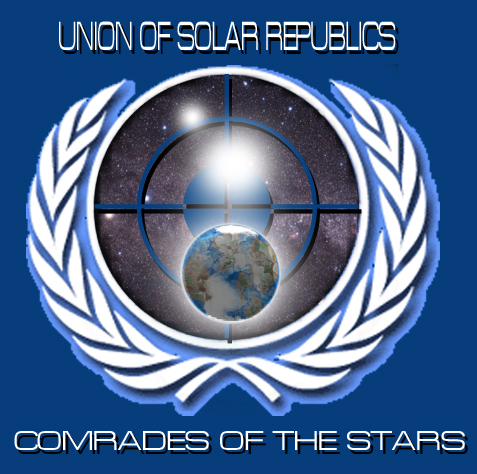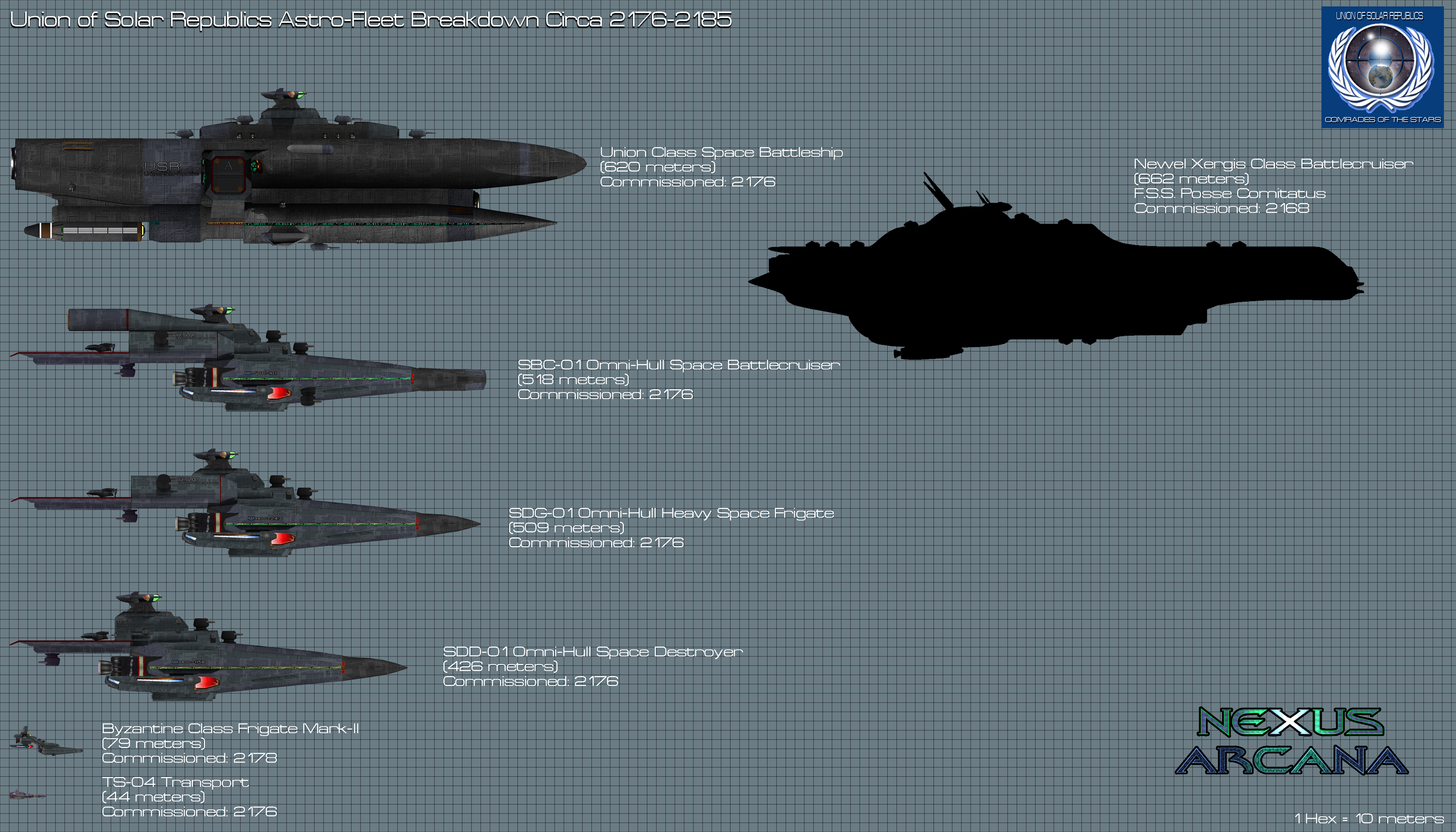
Overview of the Union of Solar Republics
Zhukovist outlaws formed this government after escaping the UN Solar Empire during the early years of the 1st Interplanetary War. The USR officially came into being in 2176 AD by popular vote of the proletarian people liberated from the UN planetoids of Vesta and Hygiea and the moons of Mars and Jupiter. This new government was a democratic-socialist Republic in which the people voted for the members of the parliament, and parliament in turn voted for the premier or president of the USR.
The Parliament was broken into three separate houses: the military House of Veterans, the civilian House of Labor, and the industrial House of Commerce.
The members of the House of Veterans were selected by popular vote of the people from members of the armed forces (both active and retired) selected from a list of retired officers and enlisted men with at least four years of military service. This house was a safeguard from civil leaders using the military against the civilian population. It also ensured that the needs of the military to protect the USR were properly handled without interference or influence by special interests from both the domestic and industrial sectors. The House of Veterans determined how their budget was divided over the three main branches of the USR military: the SpaceNavy, Spacemarines, and Orbital Guard.
The House of Labor was comprised of representatives of the common people. The House of Labor controlled the amount of tax imposed on the population and the budget for the various governmental agencies. In short, this house of parliament controlled the proverbial purse strings of the government. This house was comprised of three hundred members voted into office via a general democratic election.
The industrial House of Industry was comprised of the retired managers and overseers of the various state-owned industries who had at least four years of experience in their given field of industry. This house of the parliament determined how best to divide the resources under USR control and how and where it was best to mine for minerals both on and off planets and planetoids. Agricultural production, the size and scope of the farming, and the lands set aside for such were all determined by this house.
The Office of the Premier was the executive branch of this three-tiered government. This office controlled the domestic police and militia forces and conducted the ambassadorial tasks of the USR. The premier came into power by popular vote from all of the people of the USR in a general election. The premier held the deciding vote on any legislation from any of the three houses and could veto any bill or action by any house including, but not limited to, declarations of war, budgets, states of emergency, and limits or deregulation of industry.
The final branch of the USR government was the Judiciary. This branch consisted of a three-tier court system. The first tier was the domestic or planetary court structure made up of thousands of small state, local, continental, and planetary courts that dealt solely with planetary jurisdictions and their affairs. The second tier was the stellar court whose jurisdiction dealt with the affairs of spacestations, asteroid, moon, planetoid, and spacecraft traveling within the space controlled by the USR. The final tier was the Supreme Court whose sole purpose was to act as the final judicial authority in matters that could not be resolved in the other two tiers (such as a dispute between colonies over mining rights, or dealing with infractions by planetary governments against a citizen or citizens within their jurisdiction).
The military forces of the USR were comprised of the SpaceNavy, Spacemarines, and Orbital Guard. The USR space fleet, outposts, and bases throughout USR space comprised the Space Navy. The mission of the SpaceNavy was the exploration of space, the colonization of new worlds, protecting the security of USR space, and the protection of shipping between worlds of the USR and its allies. The Spacemarines were the offensive arm of the USR military and were comprised of the BattleKnight forces. Their primary mission was to guard newly formed colonies of the USR and to invade enemy worlds should the need arise. Similar to both the Spacemarines and Space Navy, the Orbital Guard was comprised of both escort-scale spacecraft and BattleKnight forces. The mission of the Orbital Guard was simply to defend the planets, moons, and spacestations of the USR throughout the area of space they controlled.
The domestic police force of the USR was simply a group of Marshals appointed by the premier whose sole duty was to enforce the laws of the Republic and carry out orders of the Judiciary.
Every able-bodied USR citizen between the ages of 16 and 55 who were not members of the armed forces, police, or government comprised the domestic militia forces of the USR. For this reason, the right of the citizens of the USR to purchase, own, use and wear weapons could not be regulated by the USR government as stated in Article three of their Constitution.
The media within the USR was state owned, but had the absolute right to freedom of speech and expression and, in theory, the members of the media, writers and novelists, playwrights, musicians, and artists all were able to express themselves in any way they chose and could criticize the government in any way they felt like. Zhukov believed that allowing the people to critique their government openly would help keep the rulers in check, and for the most part,
Alphonse was correct.
The USR was initially conceived of as the first phase in Alphonse Zhukovís Philosophy of Transcendental-Socialism in which the final stage would be a truly Liberal State. During this phase of his plan, the Zhukovists began molding the population, through the public education system, into a more religious and moral society. The proletarians of the former UN Solar Empire were little more than children in both their moral and deductive abilities. The Soviets had kept them down through vicious propaganda and thought control schemes, and now under the USR government the Zhukovists had to try to undo the damage as quickly as possible.
Naturally, this process was much faster with children than with adults. The youth of the USR quickly outpaced their elders as they embraced the new Zhukovist philosophies that held the real prospect of a New Social Order that would hold individual freedom in the highest regard with the moral balance of a people who would be naturally kind and generous to their fellow citizens.
The USR of the 1st Interplanetary War era held onto the Zhukovist Doctrine with an almost cult-like fanaticism that disturbed Alphonse Zhukov as he quickly began to see the flaws in his plan when members of his new government began undermining his efforts in order to erect their own vision of the UN Solar Empire.
UNION OF SOLAR REPUBLICS FLEET 2176 TO 2185 (CLICK TO ENLARGE)




